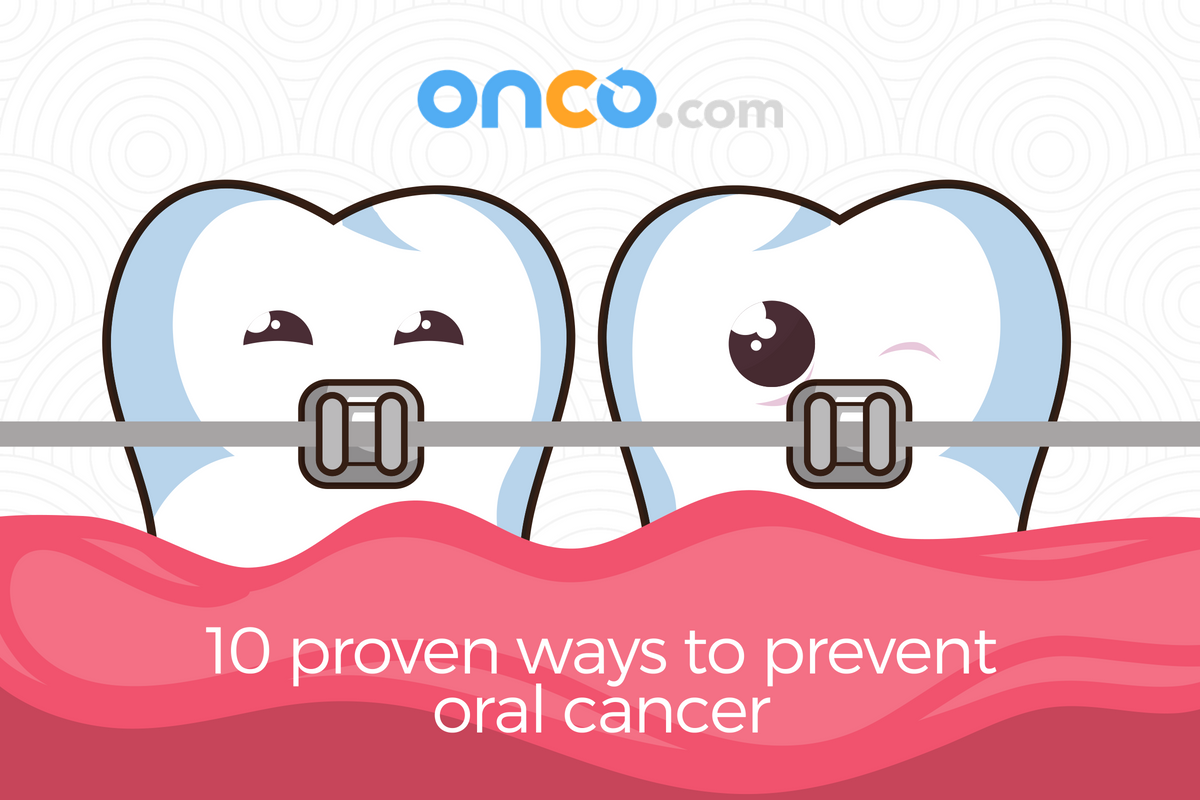Oral cancer is a national health priority, accounting for 30% of all cancers reported in India.
 It is a major problem in the Indian subcontinent, with incidence rates of about 20 per 100,000 population[1]. Its occurrence is accelerated by the indiscriminate use of tobacco, betel nuts, and alcohol in the region. The Onco.com team is pleased to share a 10-pointer checklist to prevent oral cancer effectively.
It is a major problem in the Indian subcontinent, with incidence rates of about 20 per 100,000 population[1]. Its occurrence is accelerated by the indiscriminate use of tobacco, betel nuts, and alcohol in the region. The Onco.com team is pleased to share a 10-pointer checklist to prevent oral cancer effectively.
What is oral cancer?
Oral cancer refers to any cancer of the mouth [2]. The presence of any malignant neoplasm on the lip, floor of the mouth, cheek lining, gingiva, palate or in the anterior two thirds of tongue can indicate oral cancer. It is one of the top three types of cancers, and its incidence is propelled by alcohol consumption, use of tobacco in the form of cigarettes, smokeless tobacco, chewable tobacco, chewable betelnuts, paan and sexual transmission via the human papilloma virus (HPV) infection.
How to prevent oral cancer?
The Onco.com team is pleased to present a 10-pointer guide that will help you to stay safe from this potentially fatal disease. This guide has been developed with a thorough understanding of the most common risk factors that contribute to the occurence of oral cancer. As is the case with most deadly ailments, prevention is always better than cure.
1. Maintain good oral hygiene (Important)
Make it a point to brush and floss your teeth regularly. An unhealthy mouth is a breeding ground for germs and infections. Human Papilloma Virus (HPV) infection is one of leading causes for occurrence of oral cancers. An unclean oral cavity also severely affects your immune system, and inhibits your body’s ability to fight off potential cancers.
2. Do not chew betel nuts or Paan (Important)
Betel nut chewing is the leading cause of oral cavity cancer in India. Avoid chewing betelnuts in raw or processed (pan masala) forms. Paan is a preparation made by betel leaves with Areca nuts with or without tobacco. It has been found to increase the risk for oral cancers.
3. Do not chew tobacco (Important)
Tobacco users are at a 5-fold to 25-fold increased risk of developing cancers of the oral cavity. Habit of chewing tobacco can pose an extensive threat of developing oral cancer, and should be stopped immediately.
4. Quit smoking (Important)
Smoking has been observed as a common lifestyle habit in up to 80 to 90% of all oral cancer patients. It is also seen that quitting smoking decreases the risk of oral cancer. The risk is reduced by up to 50% in people who quit smoking for more than 9 years.
5. Limit sun (UltraViolet) exposure
In addition to regular sunscreen to prevent UV damage to our skin, our lips also need to be protected. Repeated UV exposure increases the risk of cancer on the lips, especially the lower lip. Using UV-A/B-blocking sun-protection for your lips when you step outside in sun may help prevent lip cancer.
6. Exercise regularly
An active lifestyle helps to boost the immune system, and reduces your cancer risk. This includes walking, jogging, cycling, swimming, strength training or weight training.
7. Choose foods that prevent cancer (Important)
Eat a lot of beans, berries, leafy and fibrous vegetables (such as cabbage and broccoli), flax seeds, garlic, grapes, green tea, soy and tomatoes for their antioxidant properties and heightened roles in preventing cancer. Avoid fried or grilled food preparations.
8. Avoid HPV infections of the mouth
Aside from lifestyle habits, sexual transmission is also a risk factor for oral cancer. Unprotected oral sex, or exchange of reproductive fluids can lead to the transmission of the human pappilomavirus (HPV), which in turn can manifest as oral cancer. And although there are many adjunctive oral cancer screening devices and tests in the market, presently none of them can detect HPV-positive oral and oropharyngeal cancers early[3].
HPV is also the leading cause of oropharyngeal cancers. HPV-16 is the viral subtype that is responsible for most cases of oral cancer, and affects men and women equally.
9. Visit a dentist regularly (Important if you consume Alcohol or Tobacco)
It is recommended today, that you get an orthodontist to screen you for oral cancer every 6 months, expecially if you are in the habit of chewing or smoking tobacco. Even in the absence of such habits, visiting a dentist every 6 months is a great way to ensure good oral hygiene. Sharp teeth have been found to increase risk for oral cancer by way of causing repeated injuries to tissues of the mouth, a dental surgeon consultation is recommended if you have any sharp tooth.
10. Perform a self-examination at least once every month
Just like breast self-exams, oral self-exams are a great way to spot and eliminate threats early-on. Check the back and sides of your tongue thoroughly. If you see (or feel) anything suspicious, such as lumps, bumps, tender areas or colored (red/white/grey) patches, schedule an appointment with your dentist to get it checked immediately.
- NCBI/Oral-Cancer-Burden – https://www.ncbi.nlm.nih.gov/pmc/articles/PMC3471448/ ↩︎
- PreventCancer.org – https://preventcancer.org/education/preventable-cancers/oral-cancer/ ↩︎
- OralCancerFoundtion – https://oralcancerfoundation.org/understanding/hpv/hpv-oral-cancer-facts/ ↩︎


